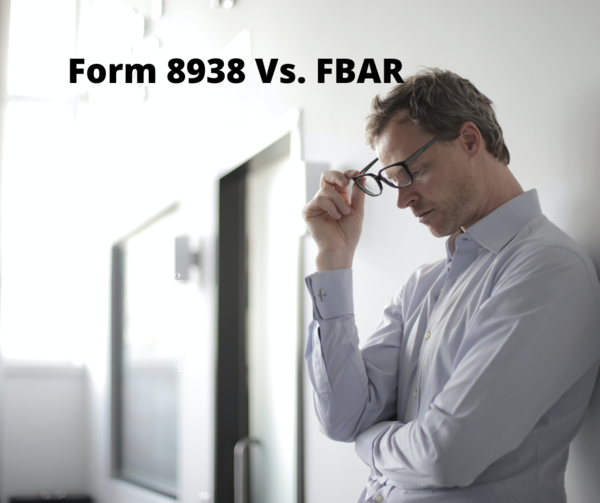The taxation process is confusing. It’s normal to think this way, considering the number of laws, rules, and forms we need to interpret. Confusion between Form 8938 and FBAR is no different.
More specifically, if you have been involved in foreign assets and accounts, both terminologies may appear similar. The confusion can lead you to use these terms interchangeably.

However, there are some differences and some similarities between the two. This article has mentioned all the information you need to know about Form 8938 and FBAR. We have also covered some of the processes you need to know while reporting and dealing with these forms.
Filing Differences Between Form 8938 and FBAR
| Conditions | Form 8938 | FBAR |
|---|---|---|
| Eligibility Requirements | It includes specific U.S. citizens and resident aliens. Moreover, some nonresident aliens have been included. It includes domestic entities as well. All are required to have financial assets in a foreign country. | It includes U.S. citizens and resident aliens. Moreover, trusts and estates have been included. All are required to have financial accounts in a foreign country. |
| Financial Reporting Limit | Variable: different for different situations. | Static: if the overall (aggregate) value of your accounts crosses $10,000, you should report this on FBAR |
| Financial Reporting Limit for Unmarried Individuals (residing in the U.S.) | The overall value of your belongings should be more than $50,000 at the end of the tax year. In between the tax year, the overall value of your assets should be more than $75,000. | It doesn’t apply; it only counts the aggregate value ($10,000). |
| Financial Reporting Limit for married Individuals (residing in the U.S.) | The overall value of your belongings should be more than $100,000 at the end of the tax year. In between the tax year, the overall value of your assets should be more than $150,000. | It doesn’t apply; it only counts the aggregate value ($10,000). |
| Financial Reporting Limit for Unmarried Individuals (residing outside the U.S.) | The overall value of your belongings should be more than $200,000 at the end of the tax year. In between the tax year, the overall value of your assets should be more than $300,000. | It doesn’t apply; it only counts the aggregate value ($10,000). |
| Financial Reporting Limit for Married Individuals (residing outside the U.S.) | The overall value of your belongings should be more than $400,000 at the end of the tax year. In between the tax year, the overall value of your assets should be more than $600,000. | It doesn’t apply; it only counts the aggregate value ($10,000). |
Reporting Differences Between FBAR and Form 8938 to Process the Taxes
| Conditions | Form 8938 | FBAR |
|---|---|---|
| Reported For? | Your foreign assets are reported under it. You declare the maximum value of your assets. | Your foreign accounts are reported under it. You declare the maximum value of your accounts. |
| Form Deadlines | Due Date For 8938: its process is similar to the federal tax returns, including extensions. | Due Date FBAR: April 15th Automatic Extension: October 15th |
| Methods To File | Its method is similar to the federal income tax return. You get to file this with your federal income tax return. | It uses an electronic filing system. |
Penalties Difference Between Form 8938 and FBAR for Not Filing
| Conditions | Form 8938 | FBAR |
|---|---|---|
| Monetary Penalty | You can be charged up to $10,000. Extra $10,000 is charged extra for every 30 days if not filed. | It is divided into willful and non-willful penalties. Non-willful may cost you up to $12,921. Willful may cost you up to $129,210. You can also be penalized for half of your account balances. |
| Criminal Penalty | Yes, it may subject you to a criminal penalty. | Yes, it may subject you to a criminal penalty. |
Moreover, the IRS has written additional details explaining the difference between Form 8938 and FBAR.
Essential Points to Note While Dealing with FBAR and Form 8938
We have gathered some critical points before you file any of these forms. Both forms may appear confusing to you, and you may end up being in trouble while filing these forms incorrectly.
Here are some of the points to note:
- All the foreign accounts should be listed on Form 8938 with their maximum amount in a separate list.
- Both Form 8938 and FBAR require a detailed individual analysis of documents. You should NOT assume that if the accounts have been reported on one form, they are not supposed to be reported on another form.
- Reporting the duplicate accounts on Form 8938 that you have documented on FBAR (without analyzing and reporting your assets) can potentially lead to a penalty.
Should I File Form 8938 or FBAR?
If you analyze the above-listed information, you will know that taxation needs a severe contextual analysis of your situation.
At AkifCPA, we have spent years filing taxes and solving practical issues. Contact us today, and we’ll analyze your situation to help you answer your questions.
We’ll make sure that you save your money with us.
